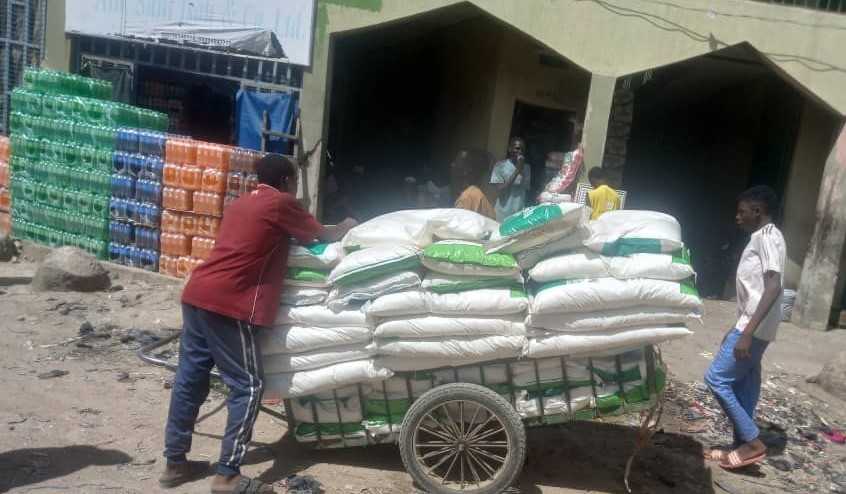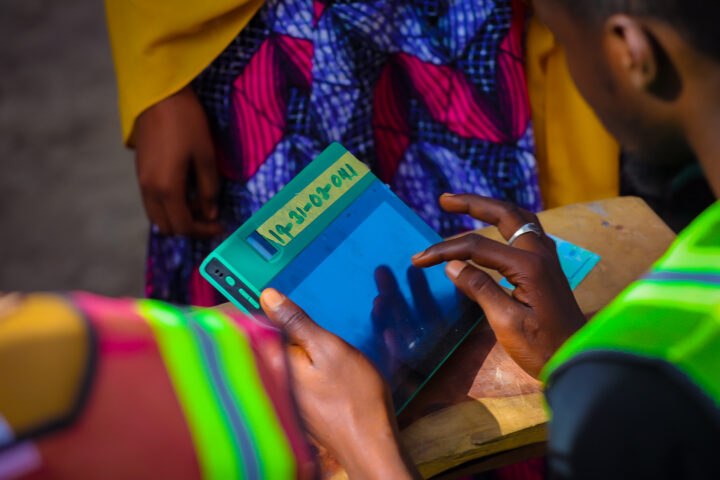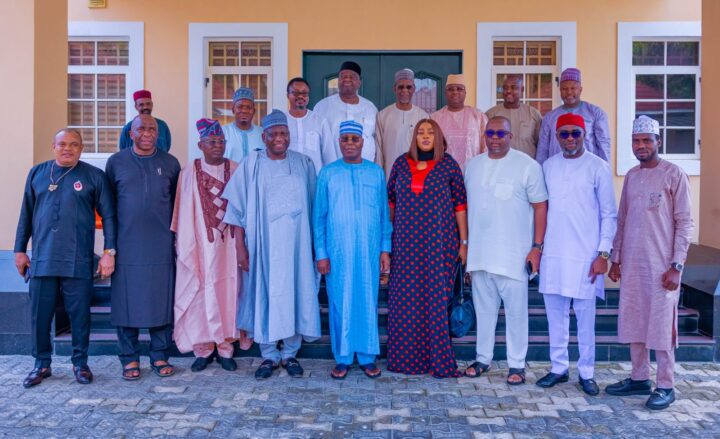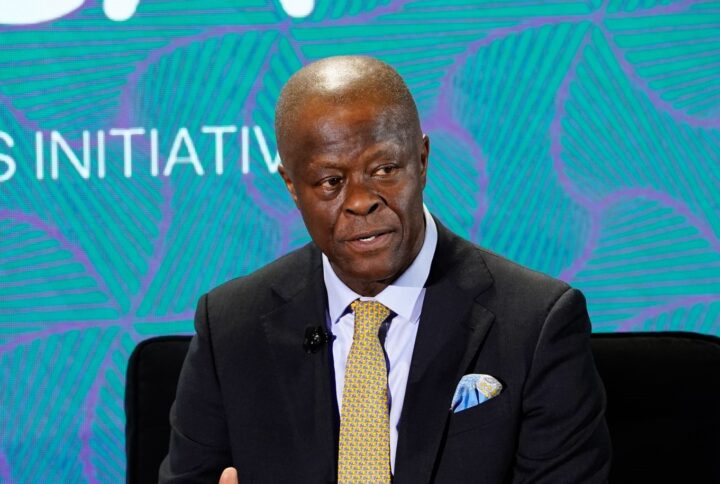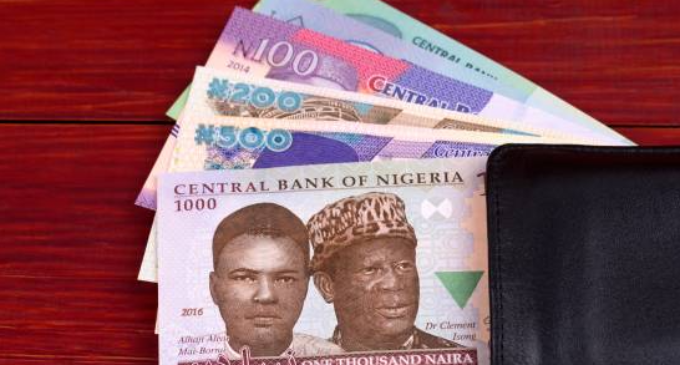Bags of Fufeng MSG waiting to be offloaded at Singer market, Kano.
Photo Credit: Yekeen Akinwale
In Kano, northern Nigeria, unbranded and unauthorised additives, also known as monosodium glutamate (MSG), seem to have come to stay in the market because the demand is high. The products, popularly called white maggi by locals, are sold in 25-kg bags without approval from the National Agency for Food Drugs Administration and Control (NAFDAC).
In this report, YEKEEN AKINWALE, who went undercover at the Singer market in Kano, found out that the products were imported illegally from China and sold without authorisation.
As early as 8 a.m. on Saturday, with drivers hooting at every junction and noises of traders booming from every corner, Alhaji Aminu, a wholesale dealer at Kano’s Singer market, was busy attending to a horde of customers in his shop.
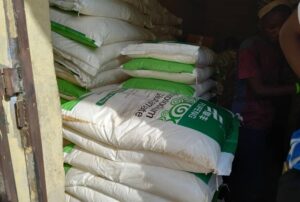
Singer is Kano’s largest commodities market situated along Ibrahim Taiwo Road.
Advertisement
As Aminu and a few of his workers were taking orders from the customers, many of whom were women, others arrived and formed a queue.
A large number of those coming to his shop were demanding a particular product: Fufeng, a made-in-China monosodium glutamate.
A corner of Aminu’s store was filled with the product in 25-kg bags. There was also a two-wheeled cart waiting outside to offload more. Despite what looked like an overwhelming situation, Aminu was having a good day, and he said it has always been like that because “people want the product”.
Advertisement
To some of the customers, including retailers, monosodium glutamate products like Fufeng are cheap and affordable.
At the Singer market, Fufeng and another MSG, Wuyi, are popular. But Fufeng appears to be the most sought-after. Consumers say the items have been in the market alongside other branded products for years.
WHAT IS MSG?
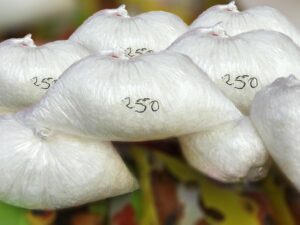
Advertisement
MSG or monosodium glutamate is a flavour-enhancing food additive used in Asian cooking, fast foods, and commercially packaged food products. It is a white crystal-like substance that has been in use for over 100 years.
Among locals in northern Nigeria, white additives in crystal form are known as “Farin Maggi”, regardless of the brand. Consumers in the south call it “white Maggi”.
Fufeng MSG is ahead of the known and branded bagged ones in the market. On the side of the bag of the MSG is written “Produced by Fufeng”, with “Country of Origin: China,” as an addendum to the information. Wuyi, the rival product, is also made in China.
Advertisement
NO MARK OF AUTHORISATION
Funfeng and some other MSG products being sold in the Nigerian market have no mark of authorisation from regulatory agencies.
Advertisement
The packaging does not bear the insignia of the National Agency for Foods Drugs Administration and Control (NAFDAC), the agency with the responsibility to certify such products as fit for human consumption. There is also no mark of the Standard Organization of Nigeria (SON) on it.
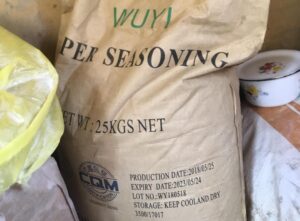
Advertisement
According to Mojisola Adeyeye, director-general (DG) of NAFDAC, any unregistered food is not guaranteed by the agency. “It is fake food. It was most likely smuggled into the country,” Adeyeye warned.
The agency is mandated to give permits and authorisation for the importation of foods and chemicals into the country.
Advertisement
‘’For safety and security concerns, NAFDAC does end-to-end monitoring for all chemicals. We request distribution and utilization patterns before we give importers permits to import chemicals,” Adeyeye was quoted as saying in a report.
“We must know who you have sold the chemicals to in your report. These are the things you must clarify to us before we give approval for a permit to clear chemical consignments.’’
THE RUSH FOR UNAPPROVED MSGS
The boom in the sale of white maggi in Kano is happening two years after three people were killed in the state after consuming adulterated flavoured milk.
Three people were arrested by NAFDAC after the agency discovered that chemicals were used as additives in the flavoured milk consumed by the victims.
Each day, as many as 20 customers buy MSG products from Aminu’s store. Though the products are not certified by NAFDAC for home use, those who buy them at the Singer market use them for retail and domestic purposes. Operators of big restaurants in the city are said to be among the big buyers.
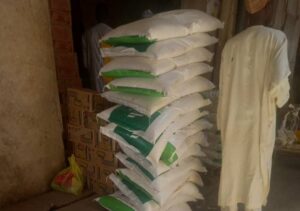
Fufeng comes cheaper at N43,000 per 25kg and allows wholesalers and retailers to sell in small units, including measuring in what locals call “mudu” – local parlance for a unit of measurement.
In a bag, there are as many as 10 to 15 mudu, according to a dealer who asked not to be named.
What determines the preference of customers for these unapproved products, he added, are the number of mudus and the flexibility to adulterate the product by mixing it with salt to increase its bulk and make more profit. This paves the way for adulteration with any other cheap white powdery substance.
“So, your customers know what you’re bringing… but the most acceptable in the market is one with the highest number of mudu. The higher the number of mudu and purity of the MSG, the higher the price,” he said.
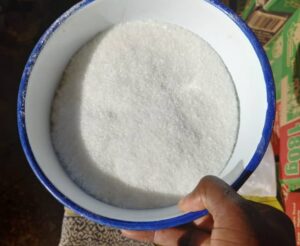
“The price of 25 kg of Fufeng monosodium glutamate in my shop is 43,000; but as a new customer, I can do a discount for you and sell it to you at the price of 42,000. I want to establish a good relationship with you so that you can come back to me and buy more,” he told this reporter as he showed the product.
“Before you sell one carton of the branded and known seasonings, you must have sold at least five sacks of the unbranded products.”
From Lagos to Kano, Fufeng and others like it have found their way to nearly all the northern markets.
The infiltration started a few years ago, according to people at Singer market. But the products have gained popularity and acceptance among households now. They are also sold at the Abubakar Rimi market (Sabon Gari market) in the state.
It is not clear how the products bypassed the scrutiny of the Nigeria Customs Service (NCS). But dealers say it comes in trucks from some businessmen that they declined to name.
The merchant confirmed that the products entered the country through illegal routes. “And if you have to follow the legal field, then you need to have a link with the company (that produces sachets) for approval,” he said.
Aminu corroborated this claim. He admitted that the products were imported through Lagos but did not reveal the identities of the importers.
“We are getting the supply from Lagos because this is not a Nigeria-made product,” Aminu said.
“This unbranded product is very popular. In the past, only people from rural areas were using it, but now everyone buys it.”
Like Aminu, Alhaji Bashir, who is also a popular dealer of MSG in the market, confirmed that the unauthorised products came through Lagos. “The product is made in China, not Nigeria,” he retorted.
“I order it from Lagos whenever I sell out the ones that are in my shop. Lagos is the source of this product. People buy this product more. That is why we are selling it.”
PUSHED BY RISING COST OF LIVING
TheCable, in a recent report, found out that millions of citizens nationwide are making lifestyle changes to survive in the “new” Nigeria.
From Ibadan to Yola, from Lokoja to Cross River, from Port Harcourt to Lagos, Nigerians are making hard decisions to survive increased economic hardship as a result of what they call the “twin demons” of subsidy removal and exchange rate instability.
Palliatives to cushion the effect of fuel subsidy removal are not changing local experiences; while some Nigerians are calling on God, others are calling on the government. Many are settling for cheap commodities, ignoring their personal safety and whether or not the items are approved, like in the case of the “Farin Maggi”.
At the Singer market, there were retailers like Alhaji Dini, who sold the products in small packets for average people who could not buy 25kg.
In his shop, he measures in “mudu”, which is N4,650.
“I’m not a dealer; I am selling it to average people who cannot afford 25kg,” he said as he showed off the small units packaged in a white cellophane bag.
“One bowl of this product is N4,650. It depends on the needs of the customers. Even if they come with N300, there is something for them. The price starts from N300 and above. You know this one is cheaper compared to the branded one.”
When he was asked if he knew that the product was not meant for domestic use yet and could be harmful to human health, he replied “No”.
“How can you tell me this is not safe for use?” Dini quipped. “This cannot happen. People have been using it for cooking. This is not the only thing I sell here. There are branded ones and different types of products.”
But Amina Kamal, a food vendor in the Sabon Gari area of Kano, has no worries about using the MSG. Amina said she uses it because it is cheap and also gives a good taste to the food.
“People like us enjoy using it because of the taste.”
Kamilu Sadiya, a housewife who was at the market, also attributed her preference for the product to the current economic reality in the market. She said prices of commodities have gone up and she decided to buy cheaper ones.
“It gives a good taste to the food, and it is cheaper,” Sadiya said.
“I don’t think it is harmful, but I heard people say that. But that does not stop me because I don’t believe it.”
FCPC, NAFDAC VOW TO TRACK UNBRANDED PRODUCTS
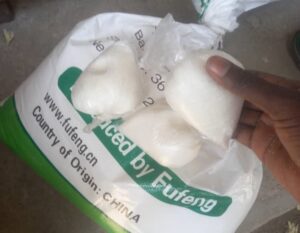
The Federal Competition and Consumer Protection Commission (FCCPC) has indicated an interest in tracking all the unbranded and unauthorised MSG products across the markets in Kano.
The FCPC is charged with the responsibility of promoting fair business practices and safeguarding the interests of consumers.
According to Boladale Adeyinka, the FCCPC director of surveillance and investigation, the commission would send its team out to get samples.
“It has come to the attention of the FCCPC and we are sending our surveillance team to confirm and secure samples,” she said in a reply to inquiries by TheCable.
“Where there is a need for emergency intervention, we will provide urgent and interim interventions. We will also provide updates.”
Adeyinka said her office is responsible for market surveillance and investigation, which are “vital tools for protecting consumers when violations occur”.
Also, NAFDAC has directed an investigation into the open sale of unauthorised MSG.
Uche Sonny-Afoekelu, director, drug registration and regulatory affairs at NAFDAC, said the directorate of post-marketing surveillance has been instructed to investigate the development.
“It’s high time we gave proponents of misleading claims the treatment that they deserve,” she said.
“False and misleading claims make a mess of all the efforts put into the registration of a product.”
Add a comment
